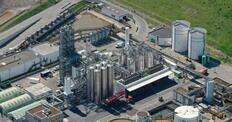- Indaver's depolymerisation plant in Antwerp, inaugurated on 25th September 2025, supplies recycled styrene monomer.
- This is Europe's first commercial-scale delivery of recycled styrene monomer.
- Depolymerisation is more energy-efficient than pyrolysis, reducing resource use and emissions.
- Recycled styrene monomer supports high-quality polystyrene production for food-grade and medical applications.

Introduction
The first truckloads of recycled styrene monomer (SM) have arrived at INEOS Styrolution’s Antwerp site, supplied by Indaver's new depolymerisation plant, the first in Europe dedicated to polystyrene recycling.
Recycling Process
Depolymerisation breaks polystyrene down into its original building block, styrene monomer, unlike mechanical recycling which processes plastic waste into pellets without altering its chemical structure. This process allows the production of new styrenics with the same quality as fossil-based products, meeting strict food-contact standards.
Environmental Impact
Depolymerisation is more energy-efficient than other advanced recycling methods like pyrolysis, reducing resource use and greenhouse gas emissions. It keeps materials in circulation, turning waste into valuable resources instead of landfill.
Applications
The recycled styrene monomer enables the production of high-quality polystyrene and other styrenics, suitable for food-grade, transparent, and medical applications. This milestone highlights polystyrene's unique ability to be broken down and rebuilt for high-value use.

